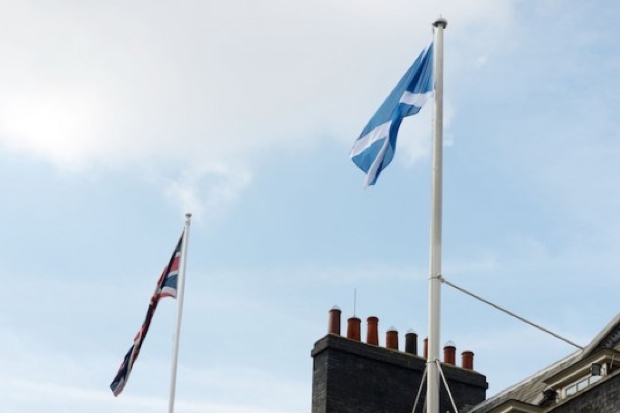Here are a number of things that the Westminster parties’ response to the narrowing Scottish independence polls have definitely not been. Absolutely definitely not.
1. A cobbled-together response
The three parties deciding to announce the new powers for Scotland and timetable for the handover of those powers in the event of a ‘No’ vote may, to the untrained eye, have looked like a last-minute, last-ditch attempt to reverse the fortunes of the Better Together campaign. But no, argued Nick Clegg today when he sat before the the Political and Constitutional Reform Committee. ‘I don’t accept the characterisation this has all been sort of cobbled together at the last minute.’ The Deputy Prime Minister argued that the ‘breakthrough statement’ on further powers came in August when all three party leaders agreed that there was an ‘irreversible process of devolution to Scotland’.
That as may be, but Gordon Brown’s announcement yesterday might never have materialised had the polls not narrowed. And the timetable – a draft Scotland Bill published by Burns Night in January 2015 – would surely never be quite so speedy were the parties not quite so desperate.
2. The Westminster leaders all looking the same
As James said earlier, the decision of Cameron, Clegg and Miliband to campaign together is risky because the Labour and Conservative leaders shouldn’t fuel the SNP’s narrative that Labour is basically the same as the Tories by being seen together. In this instance, the three leaders are definitely not better together. To avoid this, all camps are keen to stress that Cameron and Miliband will not be travelling together, will not be campaigning together, and will be nowhere near one another. If they accidentally bump into one another at an airport or railway station, they will not make eye contact. In fact, they’ll pretend they’ve never ever met.
So no joint campaign trail photos. But if they’re keen to keep their distance – which is wise – then why issue a joint statement from all three leaders announcing their intention to campaign together?
One of the reasons continuing with PMQs wouldn’t have worked was that tomorrow’s six o’clock news clip would either have been Cameron and Miliband agreeing in the Chamber, which would have been a gift to the SNP, or Cameron and Miliband knocking seven shades out of one another over the bedroom tax while MPs all around shouted and roared, which would have served the SNP’s purposes equally well.
3. Tories changing their plans in a blind panic
Should Cameron be going to Scotland at all? James reported in his column at the weekend that Number 10 had planned to keep this week clear for Labour to campaign in Scotland. But the poll and Gordon Brown’s intervention clearly changed that: it is difficult for a big policy announcement on further powers to be taken seriously if it is only delivered by a former Prime Minister and the current Prime Minister does not repeat it to Scottish voters.
The Tories also seem less worried about the impact of Conservatives from the Home Counties trying to persuade Scots to vote no than they are about the consequences of too few attempts to make the case in the last few days. They have enlisted Conservative candidates to join a continuous phone bank from Monday through to polls closing on Thursday. One insider mutters that ‘the last thing we need is a load of voices from the Home Counties calling up Scots’ – but surely the last thing the Union needs is an acceptance that somehow English people can’t talk to Scottish people.
The truth is that everyone is in a blind panic about this vote now that the polls have narrowed. Politicians don’t change their plans unless things seriously change. The three men are hoping they can stop things really, seriously changing next Thursday. But it’s too close to call.







Comments